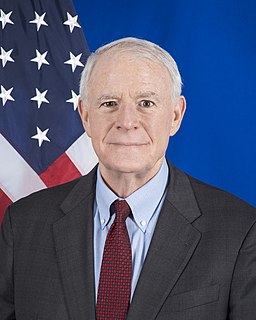A Quote by John Ruskin
Being thus prepared for us in all ways, and made beautiful, and good for food, and for building, and for instruments of our hands, this race of plants, deserving boundless affection and admiration from us, becomes, in proportion to their obtaining it, a nearly perfect test of our being in right temper of mind and way of life; so that no one can be far wrong in either who loves trees enough, and everyone is assuredly wrong in both who does not love them, if his life has brought them in his way.
Quote Topics
Related Quotes
How is it that we do not die of love in seeing that God Himself could do no more than shed His divine blood for us drop by drop? When as man He was preparing for death, He made Himself our food in order to give us life. God becomes food, bread for his creatures. Is this not enough to make us die of love?
Jesus does not divide the world into the moral "good guys" and the immoral "bad guys". He shows us that everyone is dedicated to a project of self-salvation, to using God and others in order to get power and control for themselves. We are just going about it in different ways. Even though both sons are wrong, however, the father cares for them and invites them both back into his love and feast.
Mistakes are at the very base of human thought, embedded there, feeding the structure like root nodules. If we were not provided with the knack for being wrong, we could never get anything useful done. We think our way along by choosing between right and wrong alternatives, and the wrong choices have to be made as often as the right ones. We get along in life this way.
As soon as a man stands up and says he is right or his church is right, and all others are wrong, he is himself all wrong. He does not know that upon the proof of all the others depends the proof of his own. Love and charity for the whole human race, that is the test of true religiousness. I do not mean the sentimental statement that all men are brothers, but that one must feel the oneness of human life.
By a beautiful paradox of Divine love, God makes His Cross the very means of our salvation and our life. We have slain Him; we have nailed Him there and crucified Him; but the Love in His eternal heart could not be extinguished. He willed to give us the very life we slew; to give us the very Food we destroyed; to nourish us with the very Bread we buried, and the very Blood we poured forth. He made our very crime into a happy fault; He turned a Crucifixion into a Redemption; a Consecration into a Communion; a death into Life Everlasting
There’s only one thing we can be sure of, and that is the love that we have -- for our children, for our families, for each other. The warmth of a small child’s embrace -- that is true. The memories we have of them, the joy that they bring, the wonder we see through their eyes, that fierce and boundless love we feel for them, a love that takes us out of ourselves, and binds us to something larger -- we know that’s what matters. We know we’re always doing right when we’re taking care of them, when we’re teaching them well, when we’re showing acts of kindness. We don’t go wrong when we do that.
An infinity of these tiny animals defoliate our plants, our trees, our fruits... they attack our houses, our fabrics, our furniture, our clothing, our furs ... He who in studying all the different species of insects that are injurious to us, would seek means of preventing them from harming us, would seek to cause them to perish, proposes for his goal important tasks indeed.
Let us be different in our homes. Let us realize that along with food, shelter, and clothing, we have another obligation to our children, and that is to affirm their "rightness." The whole world will tell them what's wrong with them--out loud and often. Our job is to let our children know what's right about them.
As we live our human lives, let us be like the water. Let us be conscious of the flow. Let us not forget the great ground of being that draws us on through life. Let us live in a knowing hope, aware that all being is in transition, that all movement is back to the source. Let us treat those around us as reminders of our illusionary individuality. We know that they are us and we are them connected in ways we cannot fathom. Let us grow in compassion for all beings, for they share our journey.
I have a sense that God is unfair and preferentially punishes his weak, his dumb, his fat, his lazy. I believe he takes more pleasure in his perfect creatures, and cheers them on like a brainless dad as they run roughshod over the rest of us. He gives us a need for love, and no way to get any. He gives us a desire to be liked, and personal attributes that make us utterly unlikable. Having placed his flawed and needy children in a world of exacting specifications, he deducts the difference between what we have and what we need from our hearts and our self-esteem and our mental health.
Now, I don't mean to say that being wrong is the same thing as being creative. What we do know is, if you're not prepared to be wrong, you'll never come up with anything original. If you're not prepared to be wrong. And by the time they get to be adults, most kids have lost that capacity. They have become frightened of being wrong. And we run our companies like this, by the way, we stigmatize mistakes. And we're now running national education systems where mistakes are the worst thing you can make.
Though our brother is upon the rack, as long as we ourselves are at ease, our senses will never inform us of what he suffers. They never did and never can carry us beyond our own persons, and it is by the imagination only that we form any conception of what are his sensations...His agonies, when they are thus brought home to ourselves, when we have this adopted and made them our own, begin at last to affect us, and we then tremble and shudder at the thought of what he feels.
There are degrees of loneliness, ways in which the experience of loneliness deepens, becomes something like what we might call a way of life. This way of life is both what is most damaging to us as a culture, and, paradoxically, contributes to its richness. It may in the end be our lasting contribution to the life of our planet.
There's so much humanity in a love of trees, so much nostalgia for our first sense of wonder, so much power in just feeling our own insignificance when we are surrounded by nature...yes, that's it: just thinking about trees and their indifferent majesty and our love for them teaches us how ridiculous we are - vile parasites squirming on the surface of the earth - and at the same time how deserving of life we can be, when we can honor this beauty that owes us nothing.
The trouble is that the whole 'accept Christ' attitude is likely to be wrong. It shows Christ applying to us rather than us to him. It makes him stand hat-in-hand awaiting our verdict on him, instead of our kneeling with troubled hearts awaiting his verdict on us. It may even permit us to accept Christ by an impulse of mind or emotions, painlessly, at no loss to our ego and no inconvenience to our usual way of life.






































